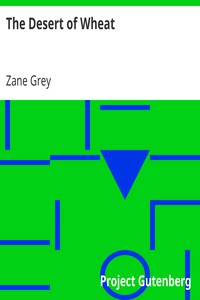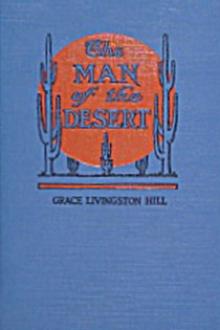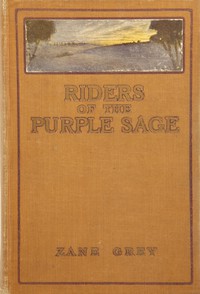The Desert of Wheat, Zane Grey [good non fiction books to read .TXT] 📗

- Author: Zane Grey
Book online «The Desert of Wheat, Zane Grey [good non fiction books to read .TXT] 📗». Author Zane Grey
Far up the slow-rising bulge of valley slope above the gleaming river two cars climbed leisurely and rolled on over the height into what seemed a bare and lonely land of green.
It was a day in June, filled with a rich, thick, amber light, with a fragrant warm wind blowing out of the west.
At a certain point on this road, where Anderson always felt compelled to halt, he stopped the car this day and awaited the other that contained Lenore and Dorn.
Lenore's joy in the ride was reflected in her face. Dorn rested comfortably beside her, upon an improvised couch. As he lay half propped up by pillows he could see out across the treeless land that he knew. His eyes held a look of the returned soldier who had never expected to see his native land again. Lenore, sensitive to every phase of his feeling, watched him with her heart mounting high.
Anderson got out of his car, followed by Kathleen, who looked glad and mischievous and pretty as a wild rose.
"I just never can get by this place," explained the rancher, as he came and stood so that he could put a hand on Dorn's knee. "Look, son—an' Lenore, don't you miss this."
"Never fear, dad," replied Lenore, "it was I who first told you to look here."
"Terrible big and bare, but grand!" exclaimed Kathleen.
Lenore looked first at Dorn's face as he gazed away across the length and breadth of land. Could that land mean as much to him as it did before he went to war? Infinitely more, she saw, and rejoiced. Her faith was coming home to her in verities. Then she thrilled at the wide prospect before her.
It was a scene that she knew could not be duplicated in the world. Low, slow-sloping, billowy green hills, bare and smooth with square brown patches, stretched away to what seemed infinite distance. Valleys and hills, with less fallow ground than ever before, significant and striking: lost the meager details of clumps of trees and dots of houses in a green immensity. A million shadows out of the west came waving over the wheat. They were ripples of an ocean of grain. No dust-clouds, no bleached roads, no yellow hills to-day! June, and the desert found its analogy only in the sweep and reach! A thousand hills billowing away toward that blue haze of mountain range where rolled the Oregon. Acreage and mileage seemed insignificant. All was green—green, the fresh and hopeful color, strangely serene and sweet and endless under the azure sky. Beautiful and lonely hills they were, eloquent of toil, expressive with the brown squares in the green, the lowly homes of men, the long lines of roads running everywhither, overwhelmingly pregnant with meaning—wheat—wheat—wheat—nothing but wheat, a staggering visual manifestation of vital need, of noble promise.
"That—that!" rolled out Anderson, waving his big hand, as if words were useless. "Only a corner of the great old U.S.!… What would the Germans say if they could look out over this?… What do you say, Lenore?"
"Beautiful!" she replied, softly. "Like the rainbow in the sky—God's promise of life!"
"An', Kathie, what do you say?" went on Anderson.
"Some wheat-fields!" replied Kathleen, with an air of woman's wisdom. "Fetch on your young wheat-sowers, dad, and I'll pick out a husband."
"An' you, son?" finished Anderson, as if wistfully, yet heartily playing his last card. He was remembering Jim—the wild but beloved son—the dead soldier. He was fearful for the crowning hope of his years.
"As ye sow—so shall ye reap!" was Dorn's reply, strong and thrilling. And Lenore felt her father's strange, heart-satisfying content.
Twilight crept down around the old home on the hill.
Dorn was alone, leaning at the window. He had just strength to lean there, with uplifted head. Lenore had left him alone, divining his wish. As she left him there came a sudden familiar happening in his brain, like a snap-back, and the contending tide of gray forms—the Huns—rushed upon him. He leaned there at the window, but just the same he awaited the shock on the ramparts of the trench. A ferocious and terrible storm of brain, that used to have its reaction in outward violence, now worked inside him, like a hot wind that drove his blood. During the spell he fought out his great fight—again for the thousandth time he rekilled his foes. That storm passed through him without an outward quiver.
His Huns—charged again—bayoneted again—and he felt acute pain in the left arm that was gone. He felt the closing of the hand which was not there. His Huns lay in the shadow, stark and shapeless, with white faces upward—a line of dead foes, remorseless and abhorrent to him, forever damned by his ruthless spirit. He saw the boy slide off his bayonet, beyond recall, murdered by some evil of which Dorn had been the motion. Then the prone, gray forms vanished in the black gulf of Dorn's brain.
"Lenore will never know—how my Huns come back to me," he whispered.
Night with its trains of stars! Softly the darkness unfolded down over the dim hills, lonely, tranquil, sweet. A night-bird caroled. The song of insects, very faint and low, came to him like a still, sad music of humanity, from over the hills, far away, in the strife-ridden world. The world of men was there and life was incessant, monstrous, and inconceivable. This old home of his—the old house seemed full of well-remembered sounds of mouse and cricket and leaf against the roof and soft night wind at the eaves—sounds that brought his boyhood back, his bare feet on the stairs, his father's aloofness, his mother's love.
Then clearly floated to him a slow sweeping rustle of the wheat. Breast-high it stood down there, outside his window, a moving body, higher than the gloom. That rustle was a voice of childhood, youth,





Comments (0)